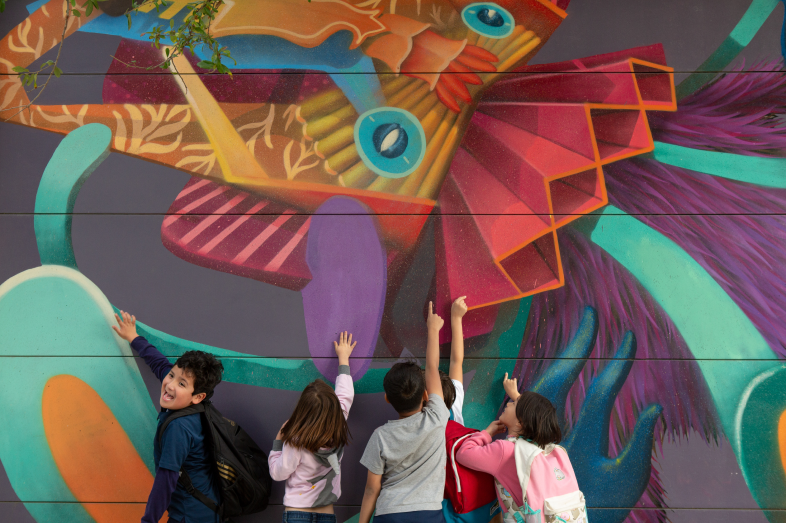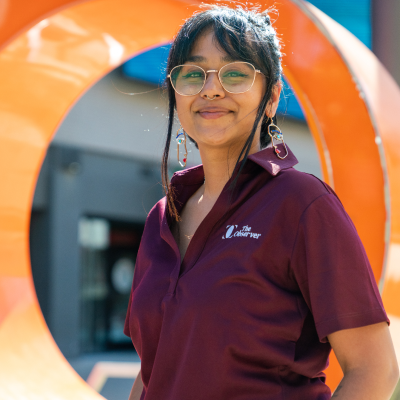In a world where education often follows the rigid confines of a classroom, some out-of-school programs are breaking the mold.
After-school program advocate Katelyn Miller, district administrator Beth Benson and educator Rae Lymer came together at the Education Writers Association’s 2023 National Seminar in Atlanta last June to talk about the effective out-of-school programs they are leading in their communities.
They said their initiatives are providing students of color and students in low-income neighborhoods with opportunities to explore their passions and potential careers, to demystify education and promote interest in learning.
“Out-of-school time is an incubator for magic,” said Lymer, the gifted education specialist for Baltimore City Public Schools.
Here’s what journalists should consider when covering these programs.
Examining Out-of-School Program Participation and Student Outcomes
Grant-funded programs, like the one run by Lymer, are changing the definition of what it means to be gifted, subverting reliance solely on test scores for eligibility and accepting any student who expresses enthusiasm.
According to Lymer, this helps diversify the cohort who attends the summer program – their demographic closely reflects that of the Baltimore school districts.
Baltimore City Public Schools’ summer offering, the Baltimore Emerging Scholars program was developed in partnership with the Johns Hopkins.Center for Talented Youth. The program is founded on the premise that “so many brilliant, talented young people across all city schools who have not been given adequate opportunities to explore talents at the rate in which they’re capable,” explained Lymer. “For our students who are not currently meeting success in their current academic space, we are really good in education at identifying what they’re not currently excelling at.”
First to fifth graders delve into subjects, including neuroscience, and learn concepts often reserved for high school or beyond. And the efforts have paid off, with “33% of kindergarten to first [grade] students scoring at or above grade level on reading assessments,” Lymer said, setting students up for future success.
However, Miller, a recent high school graduate and youth ambassador for the Afterschool Alliance, says that an effective after-school program goes beyond merely looking at test scores and academic improvements, although those can be essential indicators.
“Reaching out and providing that hand for these kids, listening and actively understanding and taking into account what they want” is important to driving better educational outcomes, Miller said.
Miller, who is Black, has benefited from out-of-school programs run by Birmingham Public Library, eventually becoming a tutor for the program.
“When it comes to the environment in which these kids are being placed in, especially with Birmingham City Schools, they are not feeding back into our programs,” Miller said about the predominantly Black neighborhood that the library serves.
Miller shared her transformative journey – one of inspiration and accessibility – at Birmingham Public Library, where 3D printers, music labs, and computer science resources opened doors she never thought possible. Her passion for computer science ignited, leading her to pursue it at the college level.
“Walking in and having that instant connection that I could do more definitely put my foot in the right direction,” said Miller, who is now attending Jackson State University.
Sometimes, the path from education to the workforce is not as linear. Beth Benson, workforce development coordinator for New Albany School District works to bridge this gap for high school students.
“These students are smarter than we give them credit for, and they can do more than me,” Benson said.
Her district’s program IMPACTO, which stands for Industry as a Means to Prepare for Academic, Career, & Technology Opportunities, connects students to summer internships to explore career pathways.
New Albany School District founded the program in 2018 with just 13 students. At the time, Benson said she had to beg companies to participate. Now boasting 74 interns, IMPACTO has proven that young students can excel in professional environments, regardless of their age. Benson highlighted that the program’s success is due to its unique collaborations.
“I’m very lucky that two school districts are working together because that doesn’t happen very often,” she said. Union County School District became part of IMPACTO in 2021.
Evaluating Effective Out-of-School Programs
Benson, Miller, and Lymer highlighted several key aspects that distinguish an effective out-of-school program:
- Joyful Learning: A red flag, Lymer noted, is when an after-school program is too quiet, with minimal student interaction. In contrast, the ideal environment should be vibrant and filled with the buzz of conversation and engagement. Joyful learning is a hallmark of quality after-school programs.
- Community-Based Learning: Out-of-school time programs provide a unique opportunity for community-based learning. Students should take the reins in learning, driving inquiry, and exploring. The presence of students who are excited about what they are learning and who can explain concepts effectively is a positive sign.
- Divergent Questioning: Quality programs encourage divergent questioning, pushing students to think creatively and critically. Instead of conventional prompts, such as research reports, they should challenge students to envision alternative scenarios, fostering innovative thinking.
Out-of-school programs have the potential to transform the lives of students, especially those who face systemic barriers to success. By fostering joyful learning, community-based experiences, and hands-on activities, these programs have the potential to ignite a passion for lifelong learning. Collaborations with local industries and personalized support further enhance their effectiveness.
Reporting Tips
- Don’t qualify a student as a “low-income student,” since a student has no income base. Instead, use the term “student from a low-income neighborhood.”
- Tell stories about student success and how schools have worked to help that student advance.
- Find stories about teachers who have made a significant impact on their community.


